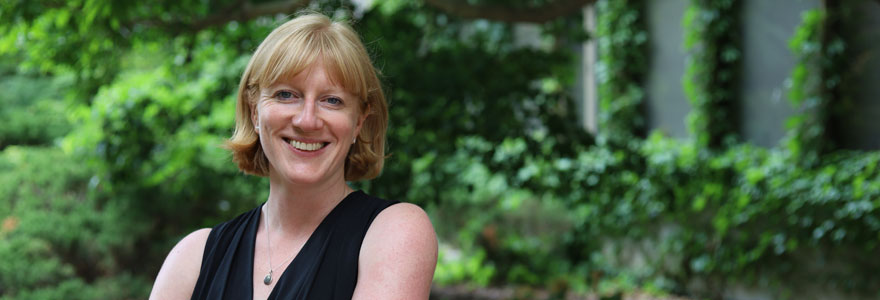News and Updates
Contact
Faculty of Social Science
Social Science Centre
Room 9438
Western University
T. 519-661-2053
F. 519-661-3868
E. social-science@uwo.ca
Building integrated climate models to improve future projections
August 19, 2022
Story and photo by Rob Rombouts
Natasha MacBean is working to improve climate models.
MacBean has joined Western University as an Assistant Professor, cross-appointed in the departments of Geography and Environment and Biology. She researches how terrestrial ecosystems respond to climate and environmental change.
MacBean looks at the impact of these changes across scales – researching impacts in specific environments, as well as the processes and responses of plant life to ongoing global environmental changes.
“We are emitting all this CO2 into the atmosphere from fossil fuel emissions and land use change. About 50 per cent of those emissions are taken up by land and ocean ecosystems, with terrestrial ecosystems taking up slightly more than the oceans,” said MacBean. “We know that picture at global scale, but we need to know more about which regions or ecosystems are contributing to that carbon sink. Plants are photosynthesizing more, but where does that carbon go? Is it stored in aboveground biomass or belowground soils? And is there a point at which, with increasing levels of CO2 in the atmosphere, the plants will become saturated and that carbon uptake will stop? How will drought and wildfire counteract that carbon sink? So, we need to know more about the interaction of all these processes, and about ecosystem limits.”
She integrates that information into global, process-based terrestrial ecosystem models that are the land component of earths system models, therefore providing more detail on how different ecosystem responses come together on a larger scale and then feedback to changes in climate.
She has recently focused on water-limited, dryland ecosystems to better understand the impact of environmental change on these environments. These water-limited ecosystems cover about 30 per cent of the terrestrial surface, and are home to about 40 per cent of the worlds’ population.
Processes in global models, MacBean said, were typically developed using data from temperate forest and grassland ecosystems. “We have shown that the models do not do well in capturing the dryland carbon cycling,” she said.
While her recent work has focused on dryland ecosystems, another longer running theme in her research is to use a lot of different types of data to constrain uncertainty in models within Bayesian data assimilation systems.
“It’s a way to ensure you have the best model predictions. Models contain your best knowledge of the processes, but are inherently uncertain. Observations may capture reality, but are also uncertain and are not available everywhere. Data assimilation allows us to combine both to provide the most optimal currently model estimates and improve future projections and therefore to answer big questions about where all the emitted carbon is going, and which ecosystems are contributing the most to carbon-climate feedbacks,” she said.
MacBean is an editor of the American Geophysical Union Journal of Advances in Modeling Earth Systems (JAMES). She is also a Co-Chair of the Analysis and integration of Models Earth Systems (AIMES) project – a global research project of Future Earth. AIMES is focused on advancing understanding and modeling of interactions between humans and their environment, thus bringing together the physical and social sciences.
“It’s very valuable to not have silos between social and physical sciences,” she said. “If we don’t bring diverse disciplines together more, will have trouble developing solutions to these pressing climate and environmental change problems.”
MacBean is looking forward to working with the many researchers at Western working on climate and environmental change issues.
“Western has put sustainability as a key part of its strategic plan. It’s really exciting to be part of an institution that values sustainability, both from a research perspective and because it reflects my personal values. We are facing significant challenges as a society as we move towards more sustainable ways of living and interacting with the environment. I’m happy to be at an institution that is invested in finding solutions to address those challenges,” she said.

